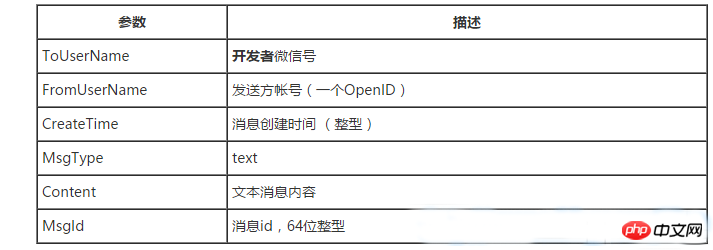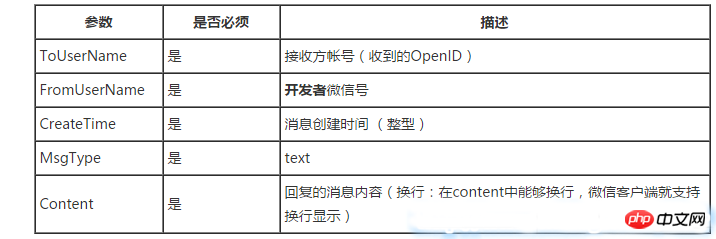 WeChat Applet
WeChat Applet
 WeChat Development
WeChat Development
 C# WeChat development principle and implementation method of receiving/returning text messages
C# WeChat development principle and implementation method of receiving/returning text messages
C# WeChat development principle and implementation method of receiving/returning text messages
This articleC#The principle and implementation method of receiving/returning text messages in WeChat development has certain reference value. Let’s take a look at it with the editor
Receive/ Returning text messages
①Instructions on the principle of receiving/returning text messages
When ordinary WeChat users send messages to public accounts, WeChat The server sends the XML data packet of the POST message to the URL filled in by the developer. Before starting development, read the WeChat development document for WeChat public platform to receive ordinary messages, and have a certain understanding of WeChat's message processing mechanism. Start development (WeChat development document for receiving ordinary messages)
Notes:
1. About retrying For message duplication, it is recommended to use msgid to deduplicate messages.
#2. If the WeChat server does not receive a response within five seconds, it will disconnect the connection and re-initiate the request, retrying three times in total. If the server cannot guarantee to process and reply within five seconds, you can directly reply with an empty string. The WeChat server will not do anything with this and will not initiate a retry. For details, please see "Send Message-Passive Reply Message".
#3. In order to ensure higher security, developers can set message encryption in the developer center on the official website of the public platform. After encryption is turned on, messages sent by users will be encrypted, and public accounts’ passive replies to users’ messages also need to be encrypted (but developers send messages to users through customer service Interface and other API calls) , will not be affected). For detailed instructions on message encryption and decryption, please see "Message Encryption and Decryption Instructions".
The XML format for POST to the developer server is:
<xml> <ToUserName><![CDATA[toUser]]></ToUserName> <FromUserName><![CDATA[fromUser]]></FromUserName> <CreateTime>1348831860</CreateTime> <MsgType><![CDATA[text]]></MsgType> <Content><![CDATA[this is a test]]></Content> <MsgId>1234567890123456</MsgId> </xml>
Receive messagePacket parameter description:

## Returns the XML format of the text message:
<xml> <ToUserName><![CDATA[toUser]]></ToUserName> <FromUserName><![CDATA[fromUser]]></FromUserName> <CreateTime>12345678</CreateTime> <MsgType><![CDATA[text]]></MsgType> <Content><![CDATA[你好]]></Content> </xml>
Return text message packet parameter description:

##②Receive/ Return text message code implementationThe developer receives the XML data packet POST from the WeChat server on his own server. The receiving code is as follows:
if(IsPostBack)
{
//*********************************自动应答代码块*********************************
string postString = string.Empty;
using (Stream stream = HttpContext.Current.Request.InputStream)
{
Byte[] postBytes = new Byte[stream.Length];
stream.Read(postBytes, 0, (Int32)stream.Length);
//接收的消息为GBK格式
postString = Encoding.GetEncoding("GBK").GetString(postBytes);
string responseContent = help.ReturnMessage(postString );
//返回的消息为UTF-8格式
HttpContext.Current.Response.ContentEncoding = Encoding.UTF8;
HttpContext.Current.Response.Write(responseContent);
}
//********************************自动应答代码块end*******************************
}ReturnMessage() processing method code is as follows:
/// <summary>
/// 统一全局返回消息处理方法
/// </summary>
/// <param name="postStr"></param>
/// <returns></returns>
public string ReturnMessage(string postStr)
{
string responseContent = "";
XmlDocument xmldoc = new XmlDocument();
xmldoc.Load(new System.IO.MemoryStream(System.Text.Encoding.GetEncoding("GB2312").GetBytes(postStr)));
XmlNode MsgType = xmldoc.SelectSingleNode("/xml/MsgType");
if (MsgType != null)
{
switch (MsgType.InnerText)
{
case "event":
responseContent = EventHandle(xmldoc);//菜单事件处理
break;
case "text":
responseContent = TextHandle(xmldoc);//文本消息处理
break;
default:
break;
}
}
return responseContent;
}TextHandle(xmldoc) processing method code is as follows:
/// <summary>
/// 接受文本消息并回复自定义消息
/// </summary>
/// <param name="xmldoc"></param>
/// <returns></returns>
public string TextHandle(XmlDocument xmldoc)
{
string responseContent = "";
XmlNode ToUserName = xmldoc.SelectSingleNode("/xml/ToUserName");
XmlNode FromUserName = xmldoc.SelectSingleNode("/xml/FromUserName");
XmlNode Content = xmldoc.SelectSingleNode("/xml/Content");
if (Content != null)
{
if (Content.InnerText == "指定回复消息的自定义文本")
{
responseContent = string.Format(XMLTemplate.Message_Text,
FromUserName.InnerText,
ToUserName.InnerText,
DateTime.Now.Ticks,
"自定义回复消息内容");
}
}
return responseContent;
}The code demonstration to implement the function here has been completed, and the rest will follow The message processing mode is also based on this method for interaction, such as: receiving/replying text messages,
Picturemessages, voice messages, Video messages, short video messages, geographical location messages, Link messages, etc. can be implemented by referring to the above code.
The above is the detailed content of C# WeChat development principle and implementation method of receiving/returning text messages. For more information, please follow other related articles on the PHP Chinese website!

Hot AI Tools

Undresser.AI Undress
AI-powered app for creating realistic nude photos

AI Clothes Remover
Online AI tool for removing clothes from photos.

Undress AI Tool
Undress images for free

Clothoff.io
AI clothes remover

AI Hentai Generator
Generate AI Hentai for free.

Hot Article

Hot Tools

Notepad++7.3.1
Easy-to-use and free code editor

SublimeText3 Chinese version
Chinese version, very easy to use

Zend Studio 13.0.1
Powerful PHP integrated development environment

Dreamweaver CS6
Visual web development tools

SublimeText3 Mac version
God-level code editing software (SublimeText3)

Hot Topics
 1378
1378
 52
52

